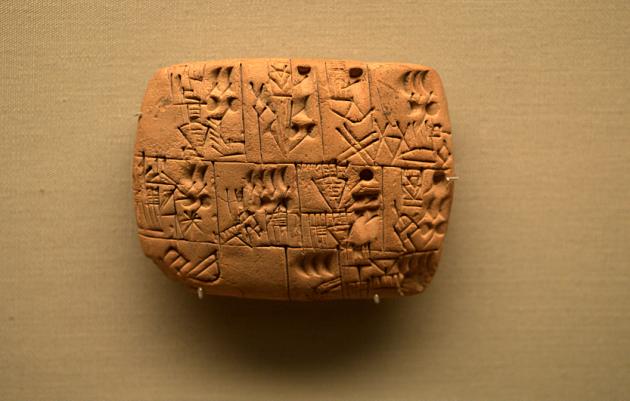
A tablet made around 3100 to 3000 BC is the world’s oldest paycheck. It’s over 5,000 years old, and originated in the ancient Mesopotamian city of Uruk. It details the payment for some workers in the city in cuneiform- a sort of hieroglyphic made from a wedge-shaped tool pressed into wet clay.
One picture depicts a man drinking from a bowl, which means ‘ration’. Another depicts a cone-shaped vase: the Mesopotamian way of writing ‘beer’. Apparently, the employers in Uruk were paying their workers in beer!
“Scattered around are scratches recording the amount of beer for a particular worker,” Alison George of the New Scientist magazine said. It also should be noted that it was likely a very valuable payment. Up until water purification systems were invented, such as boiling or filtration, all the way up until the end of the Middle Ages, many people drank watered down forms of alcohol such as beer or wine instead of water. The alcohol in the water would kill any harmful viruses, parasites, or bacteria that might make someone sick, so it was generally considered much safer (and tastier!) than drinking straight water.
Uruk was one of the oldest cities on Earth. At its height, it was an urban epicenter for anywhere from 50,000 to 80,000 people. The city was immortalized in the famous Epic of Gilgamesh, when it was apparently ruled by the famous mythological king, Gilgamesh, in the 27th-century BC. It was a rich and prosperous city in Sumer and Babylon. Not only that, but It’s considered to be the origin of the first writing system, and one very important artifact, famously called “The Mesopotamian Mona Lisa”, was unearthed at the archaeological digs in the city. It’s considered to be one of the oldest depictions of a human face in the world.
It’s unclear what exactly the workers were being paid for. Uruk was a hub of trade during the period in history that the tablet dates back to. Products from Uruk, including a very popular crude style of pottery bowl, have been found at sites all across the Mesopotamian region. The Uruk style of bowl specifically was a mass-produced product, so, perhaps these workers were a large group of potters making such bowls to be exported to the region. Who knows! All we do know was that they were very, very well equipped with lots of beer at the end of every month!
It hasn’t been uncommon in history for workers to be paid in beer or alcohol of some kind. Geoffrey Chaucer was paid in wine, and ancient Egyptian builders were paid in four to five liters of beer per day. That’s a lot of alcohol!